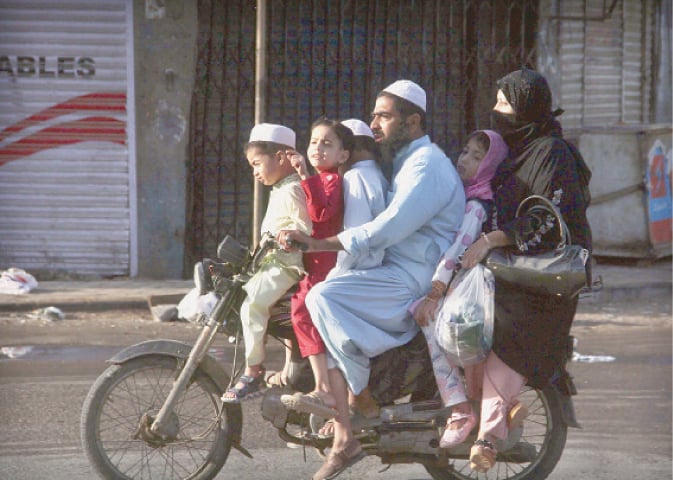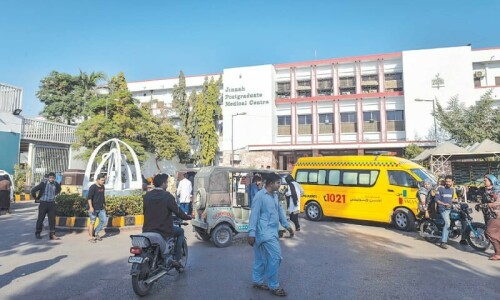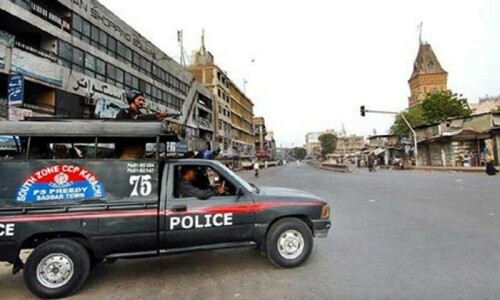
KARACHI: Though the coronavirus lockdown has brought new challenges to life, the number of road and traffic accidents have come down significantly, killing eight people and injuring four — the lowest number recorded in more than a decade in April.
Thin traffic movement on roads due to the lockdown and almost non-existence of heavy traffic on main links of the city during this period has automatically cut down the number of road accidents, resulting in a smaller number of injuries and fatalities.
Recently compiled data suggests that during April 2020 when the lockdown was in place after it was imposed on March 23, eight road accidents were reported in a month. Six accidents proved fatal, killing eight people and injuring four others. In the three earlier months — January to March 2020 — 51 people had died in road accidents, most of them in February when 24 people were killed. Thirteen people died in road accidents in January and 14 in March 2020.
An official said the number of deaths in road accidents in April had never been so low and it was for the first time in more than 10 years that the number of traffic collisions had come to a single digit figure.
‘Despite the lockdown, we have not cut the number of our officers and constables performing operational duties’
“In April 2015, 34 people died in road accidents and in the same month next year [2016] 23 people were killed on roads in different accidents involving vehicles and different modes of traffic. In April 2017, 17 people lost their lives and in the same month of the next two years [2018 and 2019] 21 each died in road accidents,” he added.
He said the least number of deaths in April was registered more than 17 years ago but that too was in double digits. Though the situation looks positive for the authorities, it does not appear surprising to them amid the reduced movement of traffic on roads and almost non-existent commercial activities during the period under study.
Officials said that heavy vehicles always remained a key factor in most of the deadly road accidents.
“The number of heavy vehicles plying in the city crossed the 100,000 mark more than a year ago, making it a serious challenge for the authorities to manage the movement of these vehicles as they pose a serious threat to other motorists,” said an official.
He referred to a report compiled by the municipal authorities regarding the traffic situation in the city and number of vehicles moving on Karachi roads suggested how big the challenge was amid growing traffic, limited available space and insufficient number of traffic policemen.
“The report says that the number of heavy vehicles in Karachi right now stands at 107,000,” said the official. “Among them is the highest number of oil tankers, which are 65,000 in total, and then 13,000 10-wheel trucks. There are some 10,000 long-haul, or 22-wheel trailer trucks, which are seen moving in the city; there are 8,000 water tankers, 7,000 dumpers and 4,000 six-wheel trucks.”
The new situation, however, has brought new challenges for the law enforcement agencies which are directly related to the imposition of lockdown and keeping the commuters off the roads under the recently-designed standard operating procedures.
“We have more than 7,000 personnel for Karachi,” DIG Javed Mahar told Dawn. “Despite the lockdown, we have not cut the number of our officers and constables performing operational duties. There are some 200 traffic intersections on different roads and key links for the imposition of lockdown. We have experienced mixed response from the people, but we have to implement the rules in the larger interest of the public.”
He said the traffic police faced challenges while enforcing the ban on pillion riding and those who were travelling on four-wheelers against SOPs set by the government. The traffic personnel, he said, were actively involved in implementing the government orders, which led to challans over violation of the pillion-riding ban and against travel of more than two persons in a car.
Published in Dawn, May 27th, 2020













































Dear visitor, the comments section is undergoing an overhaul and will return soon.